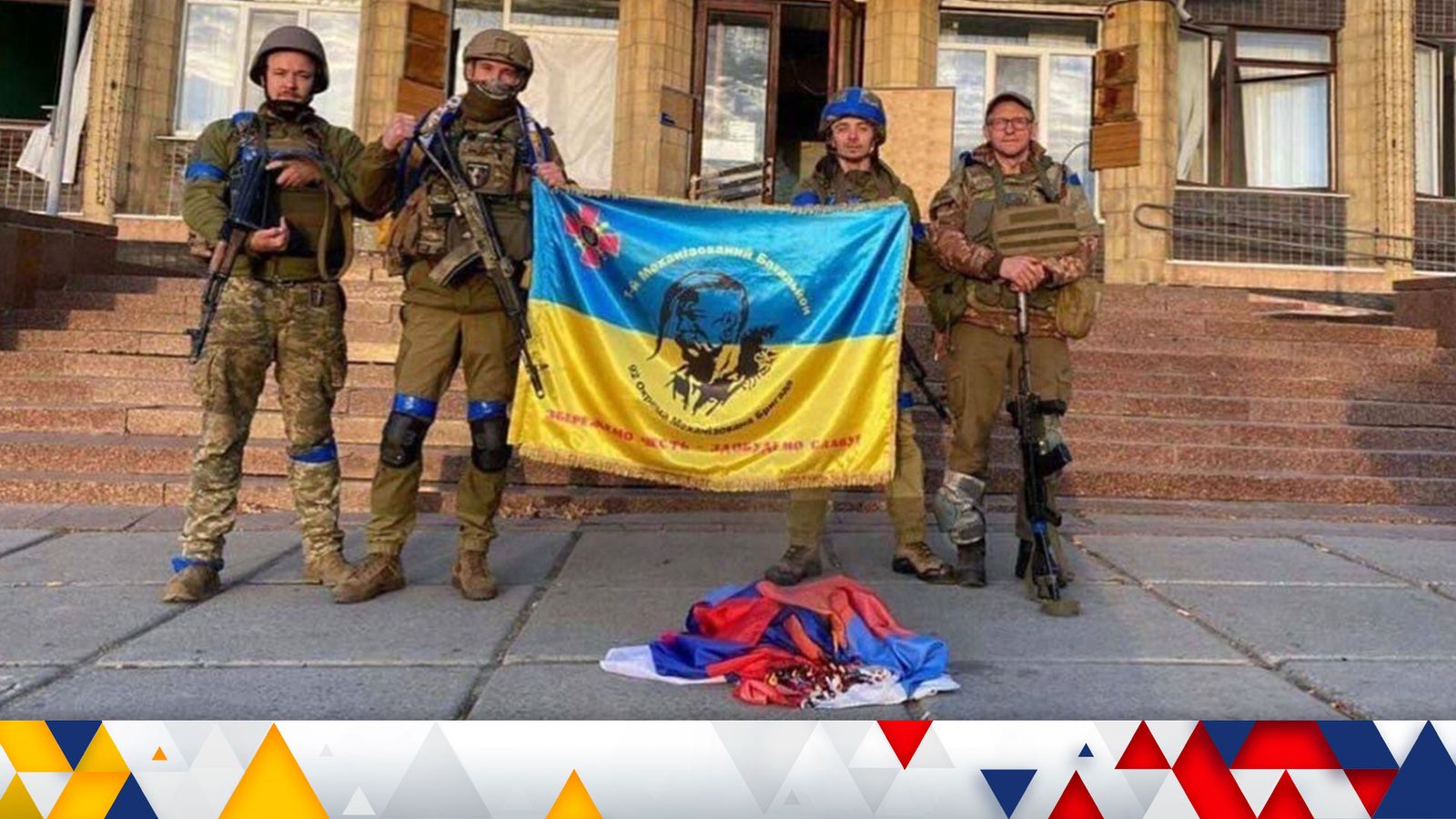Russia has ordered its troops to withdraw from two front line positions in eastern Ukraine in the face of a shock advance by Ukrainian forces.
The retreat on Saturday marked the most significant gain for Ukraine‘s military since they defeated a Russian attempt to conquer the capital, Kyiv, back in March.
Ukrainian forces, backed by increasingly powerful Western weapons, have captured hundreds of square miles of territory from Russian control in the past four days across the Kharkiv region, as the Russian line collapsed.
Analysis: How Ukraine blew a hole in Russia’s defences
Images on social media showed triumphant soldiers replacing Russian flags with the colours of yellow and blue in villages, towns and cities as they fell back under Ukrainian control after months of Russian occupation.
A top Ukrainian commander said more cities would follow as he watched a flag-raising ceremony, accompanied by the national anthem, at the small city of Banakliia, which was one of the first to be recaptured.
“I am sure that this is not the last city,” Colonel General Oleksandr Syrskyi said, dressed in full combat gear.
“Ahead of us is Kupiansk, which is already half taken by our troops. Ahead of us is Izyium and many others.”
Pictures have emerged of the Ukrainian flag flying over Kupiansk, which had been an important logistics hub for Russia to send supplies to its troops in the crucial southeastern Donbas region.
Images have also been posted of social media of Ukrainian troops at the gateway of Izyium – the main bastion for Russian forces in the area. It was a city was that captured by Russia during the first weeks of the war and had remained under Russian control ever since – until now.
Explaining the Russian withdrawal, defence ministry spokesman Igor Konashenkov said Russian troops would be regrouped from the Balakliya and Izyum areas to the Donetsk region in the Donbas.
Mr Konashenkov said the move is being made “in order to achieve the stated goals of the special military operation to liberate Donbas”.
Read more:
Royal Navy shadows Russian warships
Zelenskyy calls for demilitarisation of nuclear plant
Russian retreat ‘like an avalanche’
The claim of a pullback to concentrate on the Donbas is similar to the justification Russia gave for withdrawing its forces from the Kyiv region and the north of Ukraine earlier this year. That came after they encountered fierce Ukrainian resistance, helped by Western weapons.
The developments came amid what has largely been a media blackout regarding Ukraine’s offensive plans.
The Ukrainian military said it had launched a long-anticipated counter-offensive against Russian-controlled territory in the southern region of Kherson on 29 August.
It has blocked access for journalists to the front line, so progress of that operation has been hard to gauge.
In the past few days, however – the UK Ministry of Defence said that the start date was 6 September – Ukrainian forces have simultaneously started attacking Russian-held positions in the Kharkiv region.
Claims of significant advances in Kharkiv began to emerge in the past three days.
Vladislav Sokolov, the head of the Russian-appointed local administration, said on social media that authorities in Izyum have started evacuating residents to Russia.
Ukrainian defence minister Oleksii Reznikov told the television channel Ukraina that the Russians had no food or fuel for their troops in the area as Kyiv had cut off their supply lines
“It will be like an avalanche,” he said, predicting a Russian fallback. “One line of defence will shake, and it will fall.”
Ukrainian President Volodymyr Zelenskyy said in a nightly video address on Friday that Ukrainian troops had reclaimed more than 30 settlements in the Kharkiv region since the start of the counter-offensive.
“We are gradually taking control over more settlements, returning the Ukrainian flag and protection for our people,” Mr Zelenskyy said.









